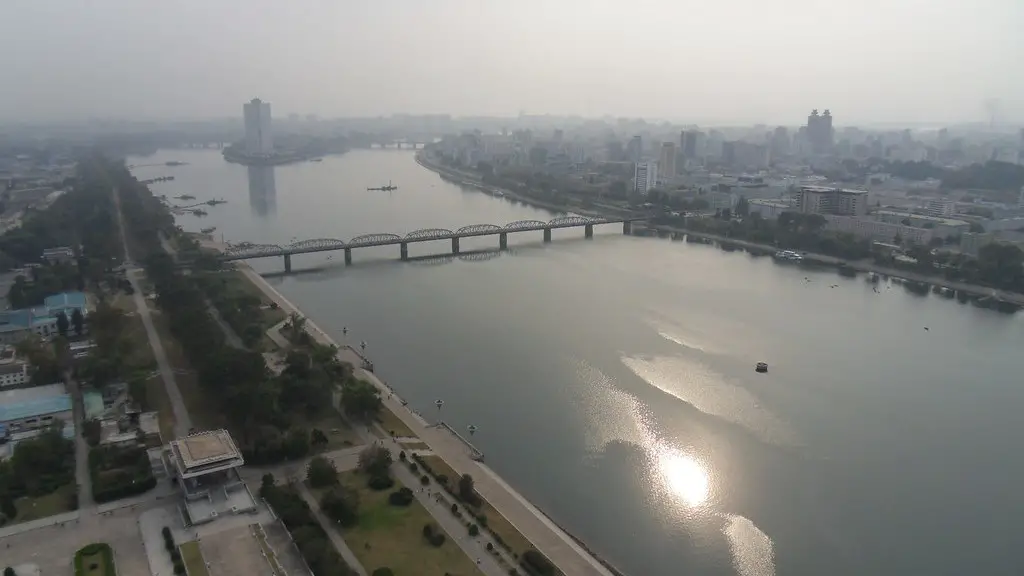Background
China is North Korea’s main ally and trading partner, and for decades it has been considered the key to unlocking progress in resolving the conflict. Chinese President Xi Jinping has significant leverage to exert over North Korea’s leader, Kim Jong-un, including access to crucial economic assistance. The Chinese government has consistently played an important role in negotiations, sanctions, and other international diplomatic efforts aimed at curbing North Korea’s nuclear programs and missile tests. But China has traditionally been reluctant to risk jeopardizing its relationship with its neighbor.
Chinese Objectives
China has a vested interest in maintaining the status quo in North Korea. It wants to prevent a collapse of Kim Jong-un’s regime, as this could create a massive refugee crisis in the Chinese border region. Chinese leaders also worry about a potentially unified Korea under Seoul’s rule, fearing it might challenge China’s regional dominance. China perceives that its best outcome is a nuclear-free and mostly isolated North Korea with a functioning economy.
China’s Role in Stopping North Korea
President Xi Jinping is one of the few people who can influence North Korea. He has good relations with the North Korean leader and up until recently maintained a strong trade relationship. He has also made efforts to use diplomatic measures to pressure Pyongyang, such as participating in the UN Security Council sanctions. China has also been involved in six-party talks, attempting to broker a peaceful resolution to the crisis.
However, China’s support has been limited as it continues to support North Korea economically in the face of international pressure. For example, China has been slow to implement UN sanctions and has been reluctant to cut off critical trade. As a result, many experts believe that the Chinese government has not done enough to force a de-nuclearization of the Korean peninsula.
Chinese Citizens’ Role
Apart from their government, Chinese citizens have shown their willingness to confront and reject North Korea’s nuclear ambitions. This was seen in the demonstrations held in Beijing in 2016, where citizens protested the actions of their own government in supporting North Korea. These protests were significant as citizens were willing to take a stand and risk facing the Chinese government’s oppressive response.
The international boycotts of South Korean-made consumer electronics conducted by Chinese citizens in 2017 also showed their desire to help stop North Korea. These boycotts managed to have a significant economic impact on South Korea, sending a clear message to North Korea that their pursuit of nuclear power was not welcome.
US Role
The US has been actively attempting to de-escalate the situation in the Korean Peninsula. The US President Donald Trump has threatened North Korea with severe consequences if they continue developing nuclear weapons, and has also held several summits with North Korean leader Kim Jong-un. Recently, the US has also increased its military presence in South Korea, in an attempt to deter North Korean aggression.
Despite these efforts, the US has failed to ensure its allies are effectively blocking North Korea’s attempts to obtain nuclear materials and other resources. The US has had difficulty in convincing China and other nations to enforce the sanctions imposed on North Korea. Unless there is a unified and comprehensive approach between the US and other nations, North Korea will not relent in their pursuit of nuclear power.
Conclusion
Overall, China has an important role to play in stopping North Korea’s nuclear ambitions. It has the leverage to force North Korea to the negotiating table, and can cut off economic assistance to the regime. It can also dissuade its citizens from boycotting South Korean consumer electronics, as this has a direct economic impact on South Korea. Additionally, China working in synergy with the US can effectively create a unified, comprehensive effort to contain North Korea’s nuclear ambitions.
UN Involvement
The United Nations has been attempting to bring about a peaceful resolution to the conflict. It has passed numerous Security Council resolutions, including economic sanctions and proposals for peace talks. The UN also created the Panel of Inquiry, which investigated North Korea’s human rights record. The report was damning; highlighting systemic abuse including torture, rape and extrajudicial executions.
Despite the UN’s efforts, its role has been largely perfunctory. It has been unable to impose an effective framework to monitor North Korea and clearly delineate their obligations. Additionally, the UN Security Council holds veto powers and has not been united in its approach to North Korea’s nuclear threat.
EU Involvement
The European Union has been perhaps the most active in attempting to put sanctions on North Korea. In 2006, the EU imposed sanctions against North Korea’s nuclear and ballistic missile programs, and in 2013 the Union extended these measures. In 2017, The EU also passed new sanctions, including a ban on all weapon sales, export credits, and vessel inspections.
The European Union has been able to maintain stronger measures in comparison to the UN, and has been vocal in its support for an overall peaceful solution. While these sanctions are significant, the EU and other nations need to confront North Korea’s enablers and support countries such as China in their efforts to contain the conflict.
Alternative Solutions
Some experts propose alternative solutions to bringing an end to the conflict. These include reaching out to other nations in the region, such as Russia, to form a multilateral agreement in containing North Korea’s nuclear ambitions. Additionally, there have been calls for pursuing a strategy of deterrence, by modernizing South Korea’s military capabilities and building a robust missile defense system.
Critics of deterrence argue that it only serves to exacerbate the already tense situation. Others argue that an economic solution might be the more effective way to deal with the conflict, with some suggesting that liberalizing the North Korean economy to give the average citizen more economic freedom might lead to a more peaceful regime.
Trade War
President Donald Trump has threatened to delay the ongoing US-China trade war if they fail to help contain North Korea. This has put additional pressure on China to help denuclearize North Korea as they have the most leverage over Kim Jong-un. Some experts argue that this might lead to a more effective approach to contain the North Korean crisis, as China will likely prioritize its trade interests over their relationship with North Korea.
However, there is the risk of a concessionary trade agreement with the US. If the US believes it will benefit at the expense of China, they may be more forgiving in regards to easing the economic sanctions. In this situation, North Korea may not be fully disarmed and the momentum for de-nuclearization might dissipate, making the conflict more intractable.
Nuclear Deal
The most promising solution to the conflict may be the prospect of a nuclear deal between Washington and Pyongyang. As with any nuclear agreement, there are particular conditions that must be met. These include the complete denuclearization of North Korea and its commitments to abide by international nonproliferation norms.
Such a process would involve all parties involved committing to long-term agreements and building trust over time. It is a process that will take time but could ultimately lead to a long-lasting solution to this crisis. However, China and other nations must also continue to work together to create an effective unified pressure campaign on North Korea to succeed.


